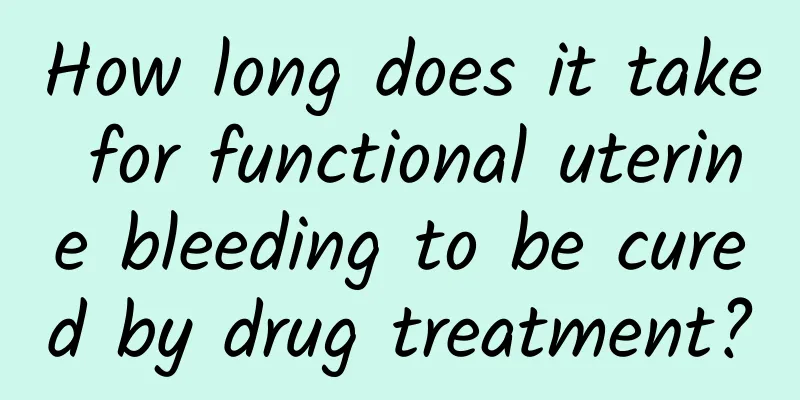How long does it take for functional uterine bleeding to be cured by drug treatment?

|
The duration of drug treatment for functional uterine bleeding varies from individual to individual, and there is no fixed standard. The specific duration should be determined according to the severity of the disease and the response to the drug. Generally, mild to moderate patients may see significant improvement after a few weeks of drug treatment, but complex cases may take longer. Dysfunctional uterine bleeding (DUB) is a common women's health problem involving abnormal bleeding caused by anovulatory cycles or endocrine imbalances. Drug treatment is usually the initial intervention, aimed at adjusting hormone levels and reducing bleeding. Commonly used drugs include oral contraceptives that can regulate hormone levels; progesterone drugs that help promote normal menstrual cycles; gonadotropin-releasing hormone agonists (GnRH agonists) that control bleeding by suppressing ovarian function. In the early stages of treatment, the doctor will adjust the dosage according to the patient's specific situation to achieve the best effect. Throughout the process, patients need to visit the doctor regularly to evaluate the effectiveness of the treatment and adjust the medication regimen. Dysfunctional uterine bleeding (DUB) is a common women's health problem involving abnormal bleeding caused by anovulatory cycles or endocrine imbalances. Drug treatment is usually the initial intervention, aimed at adjusting hormone levels and reducing bleeding. Commonly used drugs include oral contraceptives that can regulate hormone levels; progesterone drugs that help promote normal menstrual cycles; gonadotropin-releasing hormone agonists (GnRH agonists) that control bleeding by suppressing ovarian function. In the early stages of treatment, the doctor will adjust the dosage according to the patient's specific situation to achieve the best effect. Throughout the process, patients need to visit the doctor regularly to evaluate the effectiveness of the treatment and adjust the medication regimen. To further ensure efficacy and avoid potential recurrence, patients should take care to maintain a healthy lifestyle. Proper weight management and a balanced diet can help with endocrine balance, such as increasing intake of foods rich in iron and vitamin B to cope with anemia caused by blood loss. Appropriate exercise, like yoga and walking, can help relieve stress and improve overall health. During drug treatment, it is very important to maintain communication with your doctor so that any adverse reactions or complications can be addressed in a timely manner. If symptoms do not improve or worsen after a period of time, it is recommended to discuss with a medical professional again to explore other treatment options or further diagnosis. |
<<: Can I get pregnant with pelvic inflammatory mass?
>>: What causes pain in adnexitis?
Recommend
Is Grade 1 Chronic Cervicitis Serious in Women? Pay Attention to Two Key Points in Treating Chronic Cervicitis
Chronic cervicitis is a very common gynecological...
What are the Chinese patent medicines for patients with cervical precancerous lesions?
Cervical precancerous lesions are one of the fema...
What ointment can be used for vulvar leukoplakia during lactation? It itches and white tofu residue is scratched out during lactation.
Breastfeeding is a special stage that every mothe...
To live you have to move! 3 reasons why you should exercise
What the Cofit Nutrition Team wants to tell you i...
Can I detect a miscarriage after it occurs?
Nowadays, the openness of sex life has caused man...
Do the Downward Dog pose in yoga to boost metabolism, burn fat, and detoxify!
Practicing yoga every day not only sculpts your b...
High-pressure fat people age prematurely! Supplement the right nutrition to keep your brain young
You forget things, your reactions become slower a...
What are the causes of congenital absence of vagina?
What are the causes of congenital absence of vagi...
Diet therapy for vulvar itching
Vulvar itching is also a common symptom that both...
Several vegetables that can easily cause miscarriage
There is no evidence that certain vegetables can ...
How can girls with dysmenorrhea soak their feet to relieve stomach pain? Is soaking feet useful for girls with dysmenorrhea?
Dysmenorrhea is a problem that many girls have to...
What are the symptoms of uterine fibroids? How are uterine fibroids treated?
Uterine fibroids, also known as uterine leiomyoma...
Is microwave therapy good for severe cervical erosion?
Is microwave therapy good for severe cervical ero...
What are the symptoms of pelvic inflammatory disease in women
What are the symptoms of pelvic inflammatory dise...
How can office workers prevent adnexitis?
Adnexitis mainly refers to inflammation of the ov...









